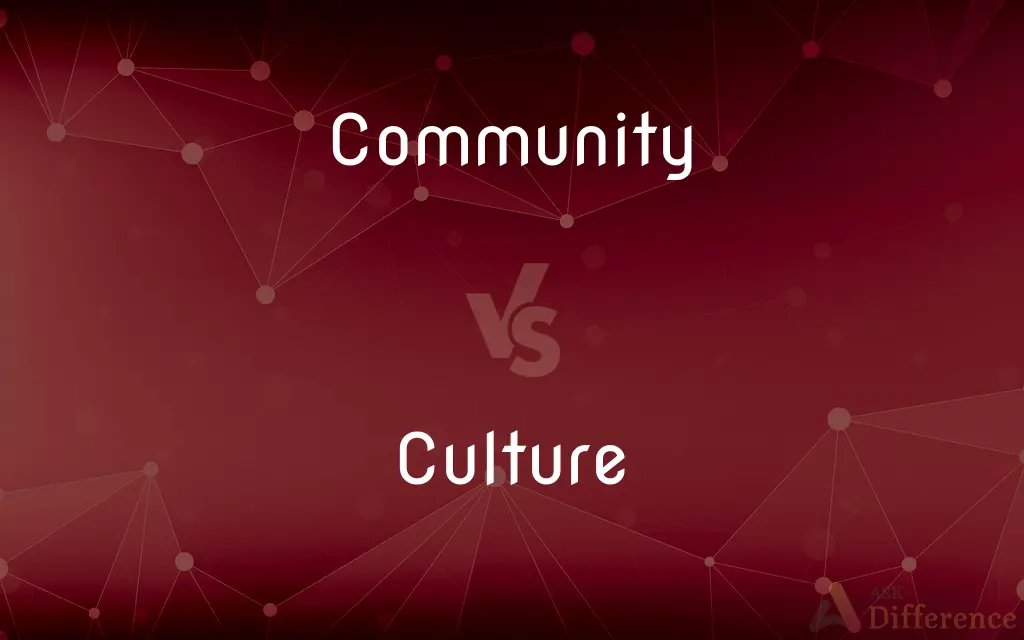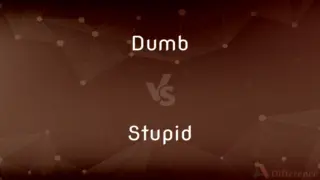Community vs. Culture — What's the Difference?
Edited by Tayyaba Rehman — By Urooj Arif — Updated on March 7, 2024
Community refers to a group of people living in the same place or having a particular characteristic in common, while culture encompasses the ideas, customs, and social behavior of a particular people or society.

Difference Between Community and Culture
Table of Contents
ADVERTISEMENT
Key Differences
Community is primarily about the social unit of any size that shares common values, interests, or identities, often marked by a sense of belonging and mutual support. Whereas, culture represents the collective practices, languages, traditions, and beliefs that define the way of life for that community or social group, shaping individuals' perceptions and behaviors.
While a community can be defined by geographical boundaries or shared interests, providing a sense of identity and belonging to its members, culture goes deeper into the collective psyche, embodying the learned patterns of behavior, beliefs, and knowledge that are passed down from generation to generation. Culture gives the community its unique character but is not limited by the community's geographical boundaries.
Communities often form around cultural similarities, but they also exist within larger or more diverse cultural contexts. For example, a local community might share a common culture, while an online community might connect people across different cultural backgrounds based on shared interests or goals. Culture, on the other hand, influences how community members interact, celebrate, and uphold shared values.
Culture encompasses more than just the tangible aspects of a community, such as language, art, and rituals; it also includes intangible elements like norms, values, and ethics that guide how people in a community live and make decisions. Communities provide the structure for social interaction, but culture provides the content and meaning behind these interactions.
The development and sustainability of a community are influenced by its culture, as cultural values and practices determine how members cooperate, resolve conflicts, and support one another. Conversely, the experiences and interactions within a community can lead to the evolution of its culture, reflecting changes in social dynamics, innovations, and external influences.
ADVERTISEMENT
Comparison Chart
Definition
A group of people with common characteristics
The collective ideas, customs, and social behaviors
Focus
Social unit and belonging
Beliefs, practices, and norms
Basis
Geographical location or shared interest
Learned behavior and knowledge
Manifestation
Through social interactions and mutual support
Through language, art, rituals, norms, and values
Influence
Shapes social structure
Shapes perceptions and behaviors
Relationship
Can form around cultural similarities
Influences community interactions
Compare with Definitions
Community
Social grouping.
The local community gathered to discuss neighborhood safety.
Culture
Collective customs and beliefs.
The culture of the region is known for its unique festivals and foods.
Community
Sense of belonging.
Moving to a new city, she quickly became part of a welcoming community.
Culture
Artistic and linguistic expressions.
The culture's rich history is evident in its traditional music and dance.
Community
Geographical or virtual spaces.
The online community for writers has members from around the world.
Culture
Social norms and values.
Respect for elders is a significant aspect of their culture.
Community
Mutual support.
The community rallied together to support the family after the fire.
Culture
Intangible elements.
The culture of innovation in the company encourages creative problem-solving.
Community
Shared interests.
The gaming community online is very active and supportive.
Culture
Way of life.
Traveling allows you to experience different cultures and perspectives.
Community
A community is a social unit (a group of living things) with commonality such as norms, religion, values, customs, or identity. Communities may share a sense of place situated in a given geographical area (e.g.
Culture
Culture () is an umbrella term which encompasses the social behavior and norms found in human societies, as well as the knowledge, beliefs, arts, laws, customs, capabilities, and habits of the individuals in these groups.Humans acquire culture through the learning processes of enculturation and socialization, which is shown by the diversity of cultures across societies. A cultural norm codifies acceptable conduct in society; it serves as a guideline for behavior, dress, language, and demeanor in a situation, which serves as a template for expectations in a social group.
Community
A group of people living in the same locality and under the same government.
Culture
The arts, beliefs, customs, institutions, and other products of human work and thought considered as a unit, especially with regard to a particular time or social group
Edwardian culture.
Japanese culture.
Community
The district or locality in which such a group lives.
Culture
These arts, beliefs, and other products considered with respect to a particular subject or mode of expression
Musical culture.
Oral culture.
Community
A group of people having common interests
The scientific community.
The international business community.
Culture
The set of predominating attitudes and behavior that characterize a group or organization
A manager who changed the corporate culture.
Community
A group viewed as forming a distinct segment of society
The gay community.
The community of color.
Culture
Mental refinement and sophisticated taste resulting from the appreciation of the arts and sciences
A woman of great culture.
Community
Similarity or identity
A community of interests.
Culture
Special training and development
Voice culture for singers and actors.
Community
Sharing, participation, and fellowship
A sense of community.
Culture
The cultivation of soil; tillage
The culture of the soil.
Community
Society as a whole; the public.
Culture
The breeding or cultivation of animals or plants for food, the improvement of stock, or other purposes.
Community
A group of organisms interacting with one another and with the environment in a specific region.
Culture
The growing of microorganisms, tissue cells, or other living matter in a specially prepared nutrient medium.
Community
The region occupied by a group of interacting organisms.
Culture
Such a growth or colony, as of bacteria.
Community
(countable) A group sharing a common understanding, and often the same language, law, manners, and/or tradition.
Culture
To cultivate (soil or plants).
Community
(countable) A residential or religious collective; a commune.
Culture
To grow (microorganisms or other living matter) in a specially prepared nutrient medium.
Community
A group of interdependent organisms inhabiting the same region and interacting with each other.
Culture
To use (a substance) as a medium for culture
Culture milk.
Community
A group of people interacting by electronic means for educational, professional, social, or other purposes; a virtual community.
Culture
The arts, customs, lifestyles, background, and habits that characterize humankind, or a particular society or nation.
Community
(uncountable) The condition of having certain attitudes and interests in common.
Culture
The beliefs, values, behaviour and material objects that constitute a people's way of life.
Community
Common enjoyment or possession; participation.
A community of goods
Culture
The conventional conducts and ideologies of a community; the system comprising the accepted norms and values of a society.
Community
Common character; likeness.
Culture
(anthropology) Any knowledge passed from one generation to the next, not necessarily with respect to human beings.
Community
Commonness; frequency.
Culture
(botany) Cultivation.
Community
A local area within a county or county borough which is the lowest tier of local government, usually represented by a community council or town council, which is generally equivalent to a civil parish in England.
Culture
(microbiology) The process of growing a bacterial or other biological entity in an artificial medium.
Community
Common possession or enjoyment; participation; as, a community of goods.
The original community of all things.
An unreserved community of thought and feeling.
Culture
The growth thus produced.
I'm headed to the lab to make sure my cell culture hasn't died.
Community
A body of people having common rights, privileges, or interests, or living in the same place under the same laws and regulations; as, a community of monks. Hence a number of animals living in a common home or with some apparent association of interests.
Creatures that in communities exist.
Culture
A group of bacteria.
Community
Society at large; a commonwealth or state; a body politic; the public, or people in general.
Burdens upon the poorer classes of the community.
Culture
(cartography) The details on a map that do not represent natural features of the area delineated, such as names and the symbols for towns, roads, meridians, and parallels.
Community
Common character; likeness.
The essential community of nature between organic growth and inorganic growth.
Culture
(archaeology) A recurring assemblage of artifacts from a specific time and place that may constitute the material culture remains of a particular past human society.
Community
Commonness; frequency.
Eyes . . . sick and blunted with community.
Culture
(euphemism) Ethnicity, race (and its associated arts, customs, etc.)
Community
A group of people living in a particular local area;
The team is drawn from all parts of the community
Culture
(transitive) to maintain in an environment suitable for growth especially of bacteria cultivate}}
Community
A group of people having ethnic or cultural or religious characteristics in common;
The Christian community of the apostolic age
He was well known throughout the Catholic community
Culture
(transitive) to increase the artistic or scientific interest in something cultivate}}
Community
Common ownership;
They shared a community of possessions
Culture
The act or practice of cultivating, or of preparing the earth for seed and raising crops by tillage; as, the culture of the soil.
Community
A group of nations having common interests;
They hoped to join the NATO community
Culture
The act of, or any labor or means employed for, training, disciplining, or refining the moral and intellectual nature of man; as, the culture of the mind.
If vain our toilWe ought to blame the culture, not the soil.
Community
The body of people in a learned occupation;
The news spread rapidly through the medical community
Culture
The state of being cultivated; result of cultivation; physical improvement; enlightenment and discipline acquired by mental and moral training; civilization; refinement in manners and taste.
What the Greeks expressed by their paidei`a, the Romans by their humanitas, we less happily try to express by the more artificial word culture.
The list of all the items of the general life of a people represents that whole which we call its culture.
Community
Agreement as to goals;
The preachers and the bootleggers found they had a community of interests
Culture
The cultivation of bacteria or other organisms (such as fungi or eukaryotic cells from mulitcellular organisms) in artificial media or under artificial conditions.
Community
A district where people live; occupied primarily by private residences
Culture
Those details of a map, collectively, which do not represent natural features of the area delineated, as names and the symbols for towns, roads, houses, bridges, meridians, and parallels.
Community
(ecology) a group of interdependent organisms inhabiting the same region and interacting with each other
Culture
To cultivate; to educate.
They came . . . into places well inhabited and cultured.
Culture
A particular society at a particular time and place;
Early Mayan civilization
Culture
The tastes in art and manners that are favored by a social group
Culture
All the knowledge and values shared by a society
Culture
(biology) the growing of microorganisms in a nutrient medium (such as gelatin or agar);
The culture of cells in a Petri dish
Culture
(bacteriology) the product of cultivating micro-organisms in a nutrient medium
Culture
A highly developed state of perfection; having a flawless or impeccable quality;
They performed with great polish
I admired the exquisite refinement of his prose
Almost an inspiration which gives to all work that finish which is almost art
Culture
The attitudes and behavior that are characteristic of a particular social group or organization;
The developing drug culture
The reason that the agency is doomed to inaction has something to do with the FBI culture
Culture
The raising of plants or animals;
The culture of oysters
Common Curiosities
What is culture?
Culture encompasses the ideas, customs, social behavior, and practices of a particular people or society.
Is culture static or dynamic?
Culture is dynamic; it evolves over time as societies develop, encounter other cultures, and adapt to changes in the environment and technology.
Can a person belong to multiple communities?
Yes, individuals can belong to multiple communities, each with different interests, geographical locations, or social connections.
What defines a community?
A community is defined by a group of people who share common characteristics, interests, or values, and often a sense of belonging.
Can culture be shared across different communities?
Yes, culture can be shared across different communities, especially in multicultural societies where diverse cultural practices are recognized and celebrated.
What role do communities play in preserving culture?
Communities play a crucial role in preserving culture by practicing, teaching, and passing down traditions, languages, and beliefs to future generations.
How does culture influence a community?
Culture influences a community by shaping its members' perceptions, behaviors, and interactions based on shared norms and values.
How do communities form around cultures?
Communities form around cultures when people with shared cultural backgrounds, beliefs, or practices come together, fostering a sense of identity and belonging.
What is the relationship between community and culture in the workplace?
In the workplace, community refers to the group of employees and their social interactions, while culture defines the shared values, practices, and norms that guide their professional behavior and attitudes.
What challenges can arise in communities with diverse cultures?
Challenges in communities with diverse cultures include misunderstandings, conflicts over values or practices, and the need for inclusivity and respect for differences.
Can the concept of community extend to online platforms?
Yes, the concept of community extends to online platforms where individuals connect over shared interests, goals, or identities, transcending geographical boundaries.
What is the importance of cultural diversity in a community?
Cultural diversity enriches a community by introducing a variety of perspectives, practices, and solutions, fostering innovation, empathy, and a broader understanding of the world.
How does a community's culture affect its approach to problem-solving?
A community's culture affects its approach to problem-solving by influencing the methods, values, and collaboration levels deemed appropriate for addressing challenges.
How are traditions maintained within a culture?
Traditions within a culture are maintained through regular practice, education, and the passing down of knowledge and rituals from one generation to the next.
How can individuals contribute to their community's culture?
Individuals contribute to their community's culture by actively participating in cultural practices, sharing knowledge, and respecting and incorporating diverse traditions and beliefs.
Share Your Discovery

Previous Comparison
Dumb vs. Stupid
Next Comparison
Capstan vs. WinchAuthor Spotlight
Written by
Urooj ArifUrooj is a skilled content writer at Ask Difference, known for her exceptional ability to simplify complex topics into engaging and informative content. With a passion for research and a flair for clear, concise writing, she consistently delivers articles that resonate with our diverse audience.
Edited by
Tayyaba RehmanTayyaba Rehman is a distinguished writer, currently serving as a primary contributor to askdifference.com. As a researcher in semantics and etymology, Tayyaba's passion for the complexity of languages and their distinctions has found a perfect home on the platform. Tayyaba delves into the intricacies of language, distinguishing between commonly confused words and phrases, thereby providing clarity for readers worldwide.














































